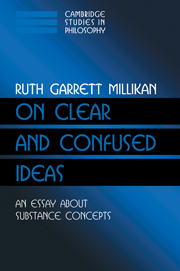Book contents
- Frontmatter
- Contents
- Preface
- Chapter 1 Introducing Substance Concepts
- Chapter 2 Substances: The Ontology
- Chapter 3 Classifying, Identifying, and the Function of Substance Concepts
- Chapter 4 The Nature of Abilities: How Is Extension Determined?
- Chapter 5 More Mama, More Milk and More Mouse: The Structure and Development of Substance Concepts
- Chapter 6 Substance Concepts Through Language: Knowing the Meanings of Words
- Chapter 7 How We Make Our Ideas Clear: Epistemology for Empirical Concepts
- Chapter 8 Content and Vehicle in Perception
- Chapter 9 Sames Versus Sameness in Conceptual Contents and Vehicles
- Chapter 10 Grasping Sameness
- Chapter 11 In Search of Strawsonian Modes of Presentation
- Chapter 12 Rejecting Identity Judgments and Fregean Modes
- Chapter 13 Knowing What I'm Thinking Of
- Chapter 14 How Extensions of New Substance Concepts are Fixed: How Substance Concepts Acquire Intentionality
- Chapter 15 Cognitive Luck: Substance Concepts in an Evolutionary Frame
- Appendix A Contrast with Evans on Information-Based Thoughts
- Appendix B What Has Natural Information to Do with Intentional Representation?
- References
- Index
Chapter 6 - Substance Concepts Through Language: Knowing the Meanings of Words
Published online by Cambridge University Press: 02 December 2009
- Frontmatter
- Contents
- Preface
- Chapter 1 Introducing Substance Concepts
- Chapter 2 Substances: The Ontology
- Chapter 3 Classifying, Identifying, and the Function of Substance Concepts
- Chapter 4 The Nature of Abilities: How Is Extension Determined?
- Chapter 5 More Mama, More Milk and More Mouse: The Structure and Development of Substance Concepts
- Chapter 6 Substance Concepts Through Language: Knowing the Meanings of Words
- Chapter 7 How We Make Our Ideas Clear: Epistemology for Empirical Concepts
- Chapter 8 Content and Vehicle in Perception
- Chapter 9 Sames Versus Sameness in Conceptual Contents and Vehicles
- Chapter 10 Grasping Sameness
- Chapter 11 In Search of Strawsonian Modes of Presentation
- Chapter 12 Rejecting Identity Judgments and Fregean Modes
- Chapter 13 Knowing What I'm Thinking Of
- Chapter 14 How Extensions of New Substance Concepts are Fixed: How Substance Concepts Acquire Intentionality
- Chapter 15 Cognitive Luck: Substance Concepts in an Evolutionary Frame
- Appendix A Contrast with Evans on Information-Based Thoughts
- Appendix B What Has Natural Information to Do with Intentional Representation?
- References
- Index
Summary
PERCEIVING THE WORLD THROUGH LANGUAGE
As I have described substance concepts, having these need not depend on knowing words. Preverbal humans, indeed, any animal that collects practical knowledge over time of how to relate to specific substances needs to have concepts of these. On the other hand, it is clear that language interacts with substance concepts in vigorous ways, completely transforming the conceptual repertoire. Putnam (1975) argued for what he called “the division of linguistic labor,” according to which laymen can borrow on the concepts of experts. Though offering an entirely different analysis, I will conclude similarly, that the public language plays a crucial role both in the acquisition of substance concepts and also in their completed structure.
The story so far about substance concepts seems to collide with the obvious fact that many of these concepts, both for children and adults, have been acquired without encountering the substances “themselves” but only by hearing about them. With regard to these very same substances, moreover, we are often in the position that Kripke (1972) and Putnam (1975) observed, having no unique descriptions of them in mind either, so that descriptionist theories of how extensions are determined also do not fit these cases. I will argue that this entire problem falls away if we view speech as a direct medium for the perception of objects.
It is traditional to assume that gathering information by being told things is a radically different sort of process from gathering information directly through perception.
- Type
- Chapter
- Information
- On Clear and Confused IdeasAn Essay about Substance Concepts, pp. 84 - 94Publisher: Cambridge University PressPrint publication year: 2000

